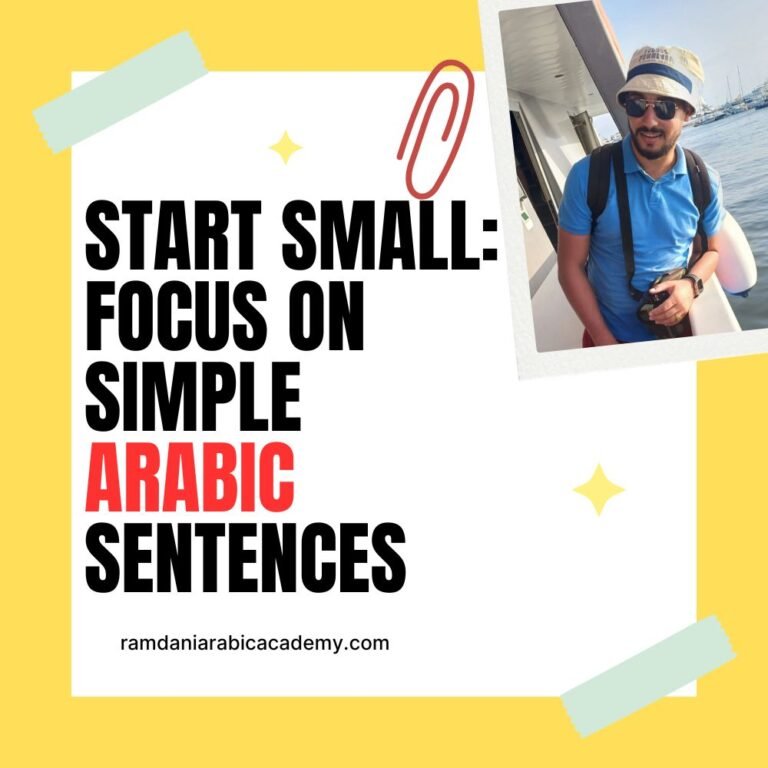How to Speak Arabic Fluently Without Studying Complex Grammar 2025
Learning Arabic can feel overwhelming when you first start. Many learners open a textbook, see the grammar rules, and stop before they even begin. You don’t have to learn Arabic this way. You can speak it without memorizing every grammar rule. You can focus on what really matters — understanding people and making yourself understood.
Arabic is one of the most spoken languages in the world. It connects you to more than 400 million speakers in over 20 countries. It is the language of a rich culture, literature, music, and history. But most people never reach fluency because they think it takes years of hard study, long lessons, and endless drills.
You already know this. You might have tried a course, read a grammar book, or followed a few lessons online. Maybe you stopped when you hit complicated concepts like verb forms or case endings. Maybe you felt you had to be perfect before speaking. That fear stops many learners from practicing, and without practice, fluency never comes.
The good news is you can speak Arabic without waiting until you know all the grammar. You learned your first language by listening, repeating, and speaking long before you ever read a grammar rule. Arabic can work the same way. If you focus on listening, speaking, and using the words you know, grammar will come naturally over time.
Fluency is not about being perfect. It is about speaking clearly and confidently so people understand you. You can make grammar mistakes and still hold great conversations. Native speakers do this too, and they still communicate with ease. The key is to build a habit of speaking every day, even with simple phrases.
In this article, we will look at how to do this step by step. You will see how to build a strong foundation with useful words and expressions, how to train your ear to understand native speakers, and how to overcome the fear of speaking. You will also see how to use grammar in a practical way without feeling stuck in long explanations.
This is not theory. These are methods used by successful learners around the world. They focus on real conversations, daily practice, and learning from mistakes. You can use them whether you live in an Arabic-speaking country or not. You just need a clear plan and a bit of consistency.
By the end, you will know how to speak Arabic more freely, how to avoid common traps that slow down learners, and how to keep improving without burning out. You will also learn about tools and resources, including Ramdani Arabic Academy, that can guide you on your journey.
You are about to see that speaking Arabic can be simple and enjoyable when you approach it the right way.

Part 1 – Focus on Communication First
The fastest way to speak Arabic is to focus on communication, not rules. Grammar is useful, but it is not the first step. You can start speaking with simple phrases and build from there.
Think about how children learn their first language. They listen for months before saying their first words. Then they use short sentences, often with mistakes. No one stops them to explain grammar. They keep speaking, and with time, their sentences get better.
You can follow the same process. Instead of opening a grammar book, start with words and phrases you will use every day. Learn how to greet people, how to ask simple questions, and how to introduce yourself.
Examples
- Hello, how are you?
- My name is…
- Where are you from?
- I want water.
- How much is this?
Once you can say these phrases, start using them. Speak to yourself if you have no partner. Repeat them out loud many times a day. The more you speak, the more natural they feel.
Listen a Lot
Listening is the key to fluency. Your brain learns patterns from hearing the language. The more you hear, the easier it becomes to speak correctly without thinking about grammar.
You can listen to:
- Podcasts for Arabic learners
- Arabic songs with clear lyrics
- Short news clips
- YouTube videos with subtitles
Don’t try to understand every word. Focus on catching familiar words and the general meaning. Over time, your brain will pick up grammar patterns automatically.
Speak Early and Often
Many learners wait until they feel “ready” to speak. That day never comes. Start speaking from day one, even if your sentences are broken.
You can:
- Talk to yourself in front of a mirror
- Record your voice and play it back
- Find a language partner online
- Join speaking groups or language exchanges
At first, you will make mistakes. That is good. Every mistake is a step toward fluency.
Think in Arabic
Try to stop translating everything in your head. Start thinking in Arabic, even with very simple words.
When you wake up, name the objects around you in Arabic. When you eat, say the food names in Arabic. When you go outside, describe what you see in short phrases.
Example:
- باب – door
- شجرة – tree
- سيارة – car
This builds a direct connection between Arabic words and ideas, not Arabic and your first language.
Use Simple Grammar Naturally
You don’t need to avoid grammar completely. Learn just enough to make simple sentences.
For example:
- Learn how to use pronouns (I, you, he, she)
- Learn how to use present tense verbs (I go, you go, he goes)
- Learn a few basic prepositions (in, on, under, with)
Practice them in real sentences. Say them out loud many times. Once they become automatic, move to the next step.
Create a Daily Habit
Short, regular practice is better than long study sessions once a week. Even ten minutes a day can lead to progress.
Daily habit example:
- 5 minutes listening
- 3 minutes speaking out loud
- 2 minutes reviewing new words
If you follow this plan every day, you will see results in weeks.

Part 2 – Build Vocabulary the Smart Way
Fluency starts with words. The more words you know, the more you can say. But you don’t need to memorize long lists from a book. You can learn words in a way that feels natural and easy to remember.
Start with High-Frequency Words
Not all words are equal. Some words appear everywhere, while others are rare. If you learn the most common words first, you can understand most everyday conversations.
Focus on:
- Greetings and polite expressions
- Numbers and time
- Food and drink
- Family and relationships
- Common verbs like go, want, do, make, say
These words cover most situations you will face as a beginner.
Learn Words in Context
Words are easier to remember when you see them in real sentences. Don’t just memorize that “بيت” means “house.” Use it in a sentence:
- أنا في البيت – I am at home
- بيت كبير – big house
- هذا بيتي – this is my house
Seeing the word in different situations shows you how to use it.
Use Visual Memory
Your brain remembers pictures better than text. Connect new words to images. When you learn the word “شجرة” (tree), look at a picture of a tree or point at a real one.
You can use flashcards with images instead of translations. Many apps offer this, or you can make your own cards. Write the Arabic word on one side, draw or paste a picture on the other side.
Repeat, but Don’t Cram
Repetition is key, but avoid cramming all words in one day. Your brain remembers better when you review words over time.
Use the spaced repetition method:
- Review new words after one hour
- Then after one day
- Then after three days
- Then after one week
This method keeps words fresh in your memory without long study sessions.
Group Words by Theme
Organize words by topic. This helps you build useful vocabulary for real conversations.
Example:
Food theme – bread, water, tea, meat, rice
Travel theme – train, bus, ticket, airport, bag
Once you know a theme, practice speaking sentences about it.
- أريد ماء – I want water
- القطار هنا – the train is here
- حقيبتي كبيرة – my bag is big
Use Words Immediately
The fastest way to remember a word is to use it right after you learn it. Make a short sentence or say it to yourself several times.
If you learn the word “قلم” (pen), say:
- عندي قلم – I have a pen
- القلم على الطاولة – the pen is on the table
This turns a word into an active part of your vocabulary.
Listen for the Words You Learn
After you learn new words, listen for them in real conversations or videos. Each time you hear a word, your brain strengthens the memory.
You might notice a word in a song, movie, or news clip. That moment helps you connect the word to real-life meaning.
Track Your Progress
Keep a small notebook or a digital list of the words you learn. Review it weekly. You will feel motivated as you see your vocabulary grow.
Building vocabulary is the foundation of fluency. With a strong word bank, you can express yourself even if your grammar is not perfect. Step by step, your sentences will get longer, your speech will get smoother, and grammar will start to make sense naturally.

Part 3 – Train Your Ear: Listening to Understand
Fluency is not just about speaking. It is also about understanding. Listening is the bridge between knowing words and speaking confidently. If you can understand native speakers, you can respond naturally without thinking about grammar rules.
Listen Every Day
Listening should be part of your daily routine. Even a few minutes a day makes a difference.
Start small:
- Short dialogues
- Arabic songs
- Simple news clips
- Short videos aimed at learners
Gradually move to longer, more complex material. Your brain will adapt to different accents and speeds over time.
Focus on Meaning, Not Every Word
Many learners try to understand every word. This slows progress and creates frustration. Instead, focus on the overall meaning.
For example, if you hear:
- أنا ذاهب إلى السوق لأشتري فاكهة – I am going to the market to buy fruit
You don’t need to understand every word immediately. Notice key words: “السوق” (market) and “فاكهة” (fruit). The brain will fill in the rest with practice.
Use Subtitles and Transcripts
Subtitles help you connect spoken words with their written form. Start with Arabic subtitles if possible.
- Watch a short clip with subtitles
- Listen first without reading
- Replay while reading subtitles
- Repeat phrases aloud
Transcripts work the same way. Reading and listening at the same time strengthens your memory and pronunciation.
Shadowing Technique
Shadowing is a powerful method to train your ear and speaking at the same time.
- Listen to a short sentence
- Pause and repeat it immediately, copying pronunciation, rhythm, and intonation
- Gradually increase speed as you get comfortable
For example, listen to:
- السلام عليكم – Peace be upon you
- كيف حالك؟ – How are you?
Repeat them aloud multiple times. This trains your mouth and brain together.
Listen to Different Dialects
Arabic has many dialects. Listening to more than one helps you recognize patterns and become flexible in conversations.
- Start with Modern Standard Arabic (MSA) for news, formal videos, and written content
- Add a dialect like Egyptian or Levantine for everyday conversation and popular media
Even if you don’t understand everything, your brain will begin to pick up patterns.
Use Real-Life Audio
Immerse yourself in real conversations. You can:
- Listen to Arabic radio or podcasts
- Watch vlogs by native speakers
- Follow social media accounts in Arabic
Real-life audio helps you understand how people speak naturally. You will notice fillers, contractions, and common expressions that textbooks ignore.
Combine Listening with Speaking
Listening alone is not enough. Immediately use the phrases you hear.
- Repeat sentences
- Answer questions from audio materials
- Imitate expressions you like
This creates active knowledge. You are not just hearing Arabic, you are using it.
Be Patient
Understanding native speakers takes time. You will hear words you don’t know, fast speech, and unfamiliar phrases. This is normal. Keep listening regularly. Over weeks, comprehension improves naturally.
Listening practice is the foundation for confident speaking. By training your ear, you reduce hesitation, understand context, and speak more naturally. Your sentences will sound authentic, and grammar will follow without forced study.

Part 4 – Speak Confidently and Use Grammar Naturally
Fluency is more than knowing words. It is about expressing yourself without hesitation. Many learners stop speaking because they fear mistakes. Confidence is the key to breaking this barrier.
Start Speaking Immediately
You don’t need perfect sentences. Start with simple expressions:
- أنا أريد – I want
- أنا أحب – I like
- هذا جيد – This is good
Even short sentences let you practice pronunciation, rhythm, and word order. Your brain will adjust naturally.
Accept Mistakes
Mistakes are part of learning. Native speakers make them too. Don’t stop speaking to “get it right.” Each error is feedback. You learn faster when you use words actively instead of only memorizing rules.
- Mispronounce a word? Repeat it correctly next time.
- Use wrong verb form? Don’t pause; finish your sentence.
- Forget a word? Describe it with words you know.
Mistakes help you internalize patterns without studying complex grammar.
Use Simple Grammar Rules
You don’t need every rule. Focus on the grammar that helps you communicate:
- Pronouns (I, you, he, she)
- Present tense verbs
- Basic past tense verbs for storytelling
- Simple prepositions (in, on, with, from)
Learn them through phrases, not lists. For example:
- أنا أدرس العربية – I study Arabic
- هي ذهبت إلى السوق – She went to the market
Repeating these sentences helps grammar become natural, not forced.
Practice with Short Conversations
Short dialogues train you for real life. Use them daily:
- Greetings and farewells
- Ordering food
- Asking directions
- Talking about hobbies
Example:
- مرحباً، كيف حالك؟ – Hello, how are you?
- بخير، شكراً. وأنت؟ – Fine, thank you. And you?
- أنا بخير. ماذا تفعل اليوم؟ – I am fine. What are you doing today?
These conversations build fluency faster than memorizing rules.
Record Yourself
Recording your voice lets you hear mistakes and track improvement.
- Read short sentences aloud
- Repeat phrases from listening exercises
- Record simple conversations with yourself
Listen back and notice:
- Pronunciation
- Word order
- Sentence flow
Correct small errors, but keep speaking. Progress comes from action, not perfection.
Find a Speaking Partner
Speaking with a partner accelerates learning. You can:
- Practice online with native speakers
- Join language exchange apps
- Pair with another learner
Real conversations give immediate feedback. They help you use words in context and build confidence.
Think in Arabic
Stop translating everything in your head. Begin thinking in Arabic, even with short phrases.
- At home, name objects around you
- Describe your day in simple sentences
- Plan small activities using Arabic
This reduces hesitation and makes speaking feel natural. Grammar and vocabulary will adjust automatically.
Make Speaking a Habit
Daily practice is essential. Short, consistent sessions are better than long, rare ones.
- 5 minutes of speaking while preparing breakfast
- 10 minutes repeating phrases from a video
- 5 minutes talking to a partner online
Consistency creates fluency faster than studying grammar rules for hours once a week.
Use Motivation to Keep Going
Fluency takes time. Celebrate small wins:
- Saying a new sentence correctly
- Understanding a short dialogue
- Completing a conversation without stopping
These moments motivate you to keep speaking and learning.
Speaking confidently comes from practice, not perfection. Combine simple grammar, active vocabulary, listening, and daily habit. Over time, you will speak Arabic naturally, without depending on grammar books or rules.

Part 5 – Advanced Strategies and Self-Study Tips
Once you have a basic vocabulary, can listen and understand, and speak simple sentences, it’s time to take your skills further. Advanced strategies help you improve faster and reach fluency without relying on complex grammar study.
Immerse Yourself in Arabic
Immersion is one of the fastest ways to improve. Surround yourself with Arabic daily:
- Watch TV shows, movies, or YouTube videos in Arabic
- Follow social media accounts that post in Arabic
- Listen to Arabic podcasts during your commute
- Read simple articles, stories, or news in Arabic
Even passive listening improves your comprehension and exposes you to natural sentence structures.
Expand Vocabulary with Themes
After learning basic words, focus on themed vocabulary to cover more topics in conversation:
- Travel: airport, hotel, map, taxi, ticket
- Shopping: price, size, color, discount, cashier
- Health: doctor, medicine, appointment, symptoms
- Hobbies: music, sports, art, games
Learning themed words lets you build sentences around real situations. Combine them with phrases you already know for natural speech.
Practice Thinking in Arabic Longer
Advanced learners train themselves to think in full sentences without translation. Start by narrating small activities:
- Cooking: “أنا أقطع الخضار وأضعها في المقلاة” – I chop the vegetables and put them in the pan
- Walking: “أرى السيارة الحمراء. إنها سريعة.” – I see the red car. It is fast
Gradually, your brain switches from translating to directly expressing ideas in Arabic.
Use Spaced Practice
Spaced practice reinforces vocabulary, listening, and speaking skills without heavy memorization:
- Review new words after a few hours
- Repeat phrases the next day
- Revisit difficult sentences after three days
This method improves retention and fluency naturally.
Record and Reflect
Recording yourself helps track improvement and notice subtle errors:
- Record short dialogues or stories
- Compare recordings over weeks
- Adjust pronunciation and sentence flow
This self-feedback loop is more effective than passive study.
Join a Community or Academy
Learning alone is harder. Being part of a community encourages practice and provides guidance. Ramdani Arabic Academy offers:
- Structured lessons for practical conversation
- Exercises focused on listening and speaking
- Articles with tips for learners around the world
- Opportunities to interact with other learners and native speakers
Joining a program like this ensures you practice consistently and receive feedback without getting stuck on grammar rules.
Set Realistic Goals
Fluency does not happen overnight. Set achievable milestones:
- Learn 10–15 new words per week
- Hold a 5-minute conversation
- Watch a short Arabic video and understand the main idea
Celebrating small wins keeps motivation high and reinforces habits.
Advice from the Author
As the founder of Ramdani Arabic Academy, I’ve worked with learners worldwide. I have seen that those who focus on communication first, practice daily, and embrace mistakes reach fluency faster than those who only study grammar.
- Speak every day
- Listen actively
- Use words immediately
- Don’t fear mistakes
- Make Arabic a part of your daily life
These simple, practical steps are the foundation of fluency.
Conclusion
Speaking Arabic fluently without studying complex grammar is possible. By focusing on communication, building vocabulary naturally, listening every day, and speaking with confidence, you can reach conversational fluency faster than you think.
Ramdani Arabic Academy provides resources, lessons, and support to guide your journey. With practice, patience, and consistency, you will speak Arabic naturally, understand native speakers, and enjoy the language without getting lost in rules.
Start today, focus on communication, and let fluency grow through practice, not memorization.







